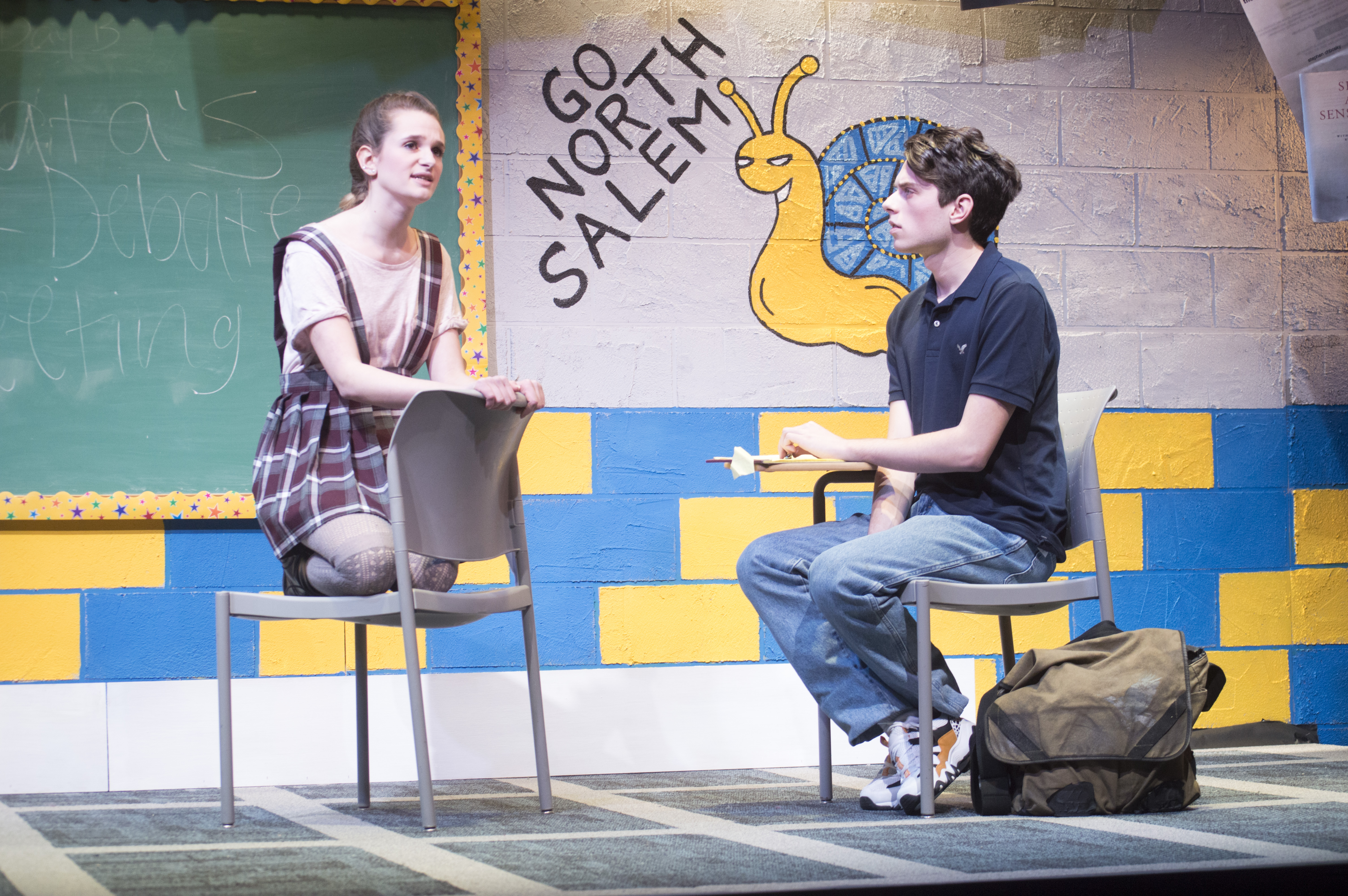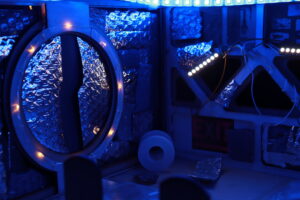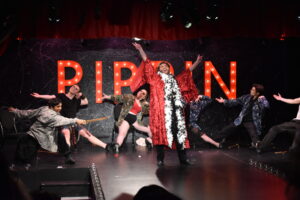Speech & Debate begins by brutally wrenching the audience back into the dark, confusing, and hazy years of high school: painted brick walls, cheesy slogans, and awkward morning announcements. Speech & Debate is a GU Theater & Performance Studies Program and Mask & Bauble Dramatic Society co-production of Stephen Karam’s play. When it begins, the actors are already on stage, but they are immersed in their individual lives, and do not acknowledge the viewers or each other. Three personal lives intersect in convoluted secrets, threats, and hypocrisies fitting for an Oregonian town named Salem. Despite the seriousness of the issues covered (sex with minors, coming out, teen pregnancy, homophobia), the play is still funny, with dancing and singing, witty banter and unbounded individuality. In the end, Speech & Debate brilliantly and innovatively explores the tipping point where the right to privacy and the right to know the truth collide.
Solomon (Nate Weiand COL ’21) wants to break through in his journalistic career by outing a local public figure; Howard (Ben Ulrich SFS ’20) wants to lie low until he finishes his senior year in a new town, and maybe start a Gay-Straight Alliance club; Diwata (Cristin Crowley MSB ’20) wants to showcase her acting talent in any way possible. In each case, Salem is too conservative for them to do so, and the three turn to the Speech & Debate club. In a magma of clashing wills, each character keeps secrets and lies in order to protect themselves throughout the play, while exposing others and criticizing them for keeping their own secrets. The three students are imperfect, which creates a realistic and relatable world.
These characters are on the precipice of adulthood, which means that while they encounter very mature issues, they often deal with them in very childish ways. All their mistakes represent teachable moments, and rewind the audience into their own adolescence. “I wanted Speech & Debate to be a confrontation with all of our high school experiences,” said director Mark Camilli (COL ’19). “To me it reminds me of some of the things that I was so passionate about when I was 17 or 16, and it reminds me of where I’m from and makes me think more about, what do I want to be when I leave here? That’s why I chose the show.”
Short, but poignant, scenes help drive the story forward. Sudden transitions build momentum, and the rising tensions eventually erupt in a specific scene that reveals the characters’ own hypocrisies. Their enclosed bubble—the claustrophobic world of the three characters—is invaded by an adult. Suddenly, the high-stake, intense machinations of the characters are reduced to child’s play: simply a high school Speech & Debate club, with papers rustling about.
Diwata’s obsession with Arthur Miller’s The Crucible, about the Salem Witch Trials, resurfaces at critical points in the play to highlight the striking similarities between the two Salems. Diwata admires the character Mary Warren from Miller’s play, who knows that the girls are lying about witchcraft existing in Salem and that the Proctors are innocent, yet ultimately decides not to help the Proctors out of fear, and even becomes an accuser herself. Diwata explains that her admiration stems from Mary’s strength to choose to protect herself over telling the truth. What is more important? The truth or protecting yourself? And can others breach your privacy in search for truth and justice? Diwata’s perspective is a striking explanation to the internal workings of Salem, Oregon (not Salem, Massachusetts), and how every character lies while outing liars.
The set is constant throughout the show, containing a main classroom, and a bedroom for each of the characters. Only the desk chairs reconfigure at different scenes.
“Having the distinct spaces was so important for this play, having a specific classroom and three specific bedroom spaces, because it allowed us to stage things that highlight the isolation that each of them goes through and the togetherness that each of them goes through, and the dichotomy between those two things,” said Camilli. “We chose to make this set where the emphasis is on this classroom the whole time and even when they can come forward to their bedroom spaces, you’re still stuck in school, you never get to leave. That’s true to high school and college.” The set also intensifies the tension between the person and community, individual will and societal duty.
The play divides its short scenes into different Speech & Debate club categories, as if suggesting that life is really just a series of speeches and debates, a constant renegotiation of reality and its imposed norms. Every day you encounter people with different experiences than you, who disrupt the idea that you have for your life, and remold it into something else.
The play opened on Jan. 24 and will run until Feb. 2. More information can be found here.




